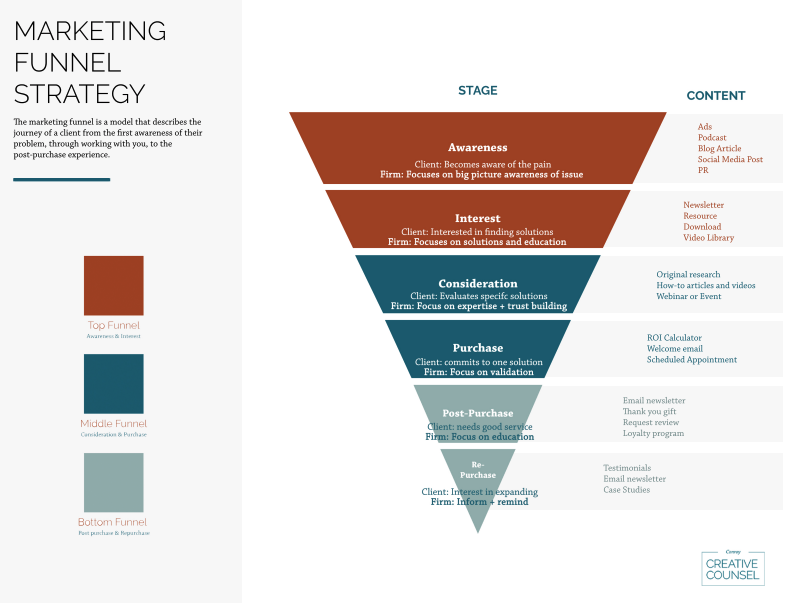Ensuring your law firm’s website design has your terms and conditions (T&Cs), which are easy to find and written clearly, is vital. Terms and conditions, also known as T&Cs, are legally binding documents when valid and enforceable and govern relationships between organizations and their clients or end-users. They generally contain terms of service, limited liability statements, special provisions, ownership rights, and privacy policies and cover other legal issues.
Having clearly defined terms and conditions adds an extra layer of protection for you from a legal standpoint and will strengthen your clients’ trust.
We will tell you some essential components to include on your T&Cs page, why a T&C page is beneficial and how to use it to develop confidence with your clients.
How To Write Terms and Conditions
T&Cs pages are foundational in helping your clientele feel more secure in working with you to display your policies, disclaimers, and processes transparently. Building relationships is an essential component of the success of your law firm.
The basic steps of writing a T&Cs page for your law firm’s website include the following:
1. Write the Introduction
When writing an introduction, start by telling the end user your law firm’s name, the services you offer, and your area of expertise if you have one. Make sure you include your trade names, affiliates, subsidiaries, parent companies, and doing business as or dba’s designations. Place all this information at the top of your terms and conditions page.
2. Draft the Terms of Service
The best law firm websites include the rules surrounding their use by clients and employees. Having clear expectations and guidelines is critical to avoid exposing yourself or your law firm to unwanted liabilities.
3. Create An Acknowledgment Statement
For it to be considered a valid contract, the end users must accept your terms and conditions. Make sure to include an acknowledgment statement that easily satisfies this contractual element. An example of an acknowledgment statement could read, “The undersigned agrees to the terms and conditions contained herein.”
4. Limit Your Liability
Your law firm can limit its liability in several ways. It’s essential to input the actions you are not responsible for, including everything from malicious attacks to illegal user-generated content. Making a clearly defined list of all prohibited activities is critical, so there is no question about permissibility.
5. Outline Who Owns Intellectual Property Rights
Intellectual property rights are intangible assets with significant value that gives your law firm recognition and the competitive advantage it needs in today’s competitive market. Inform your clients and users that the terms and conditions protect all trademarks, copyrights, logos, and other brand features.
6. Privacy Policy
An essential part of your terms and conditions is your privacy policy which will share with users The plan to handle sensitive client data. It would be best if you also incorporated a straightforward way for them to opt out of information sharing or selling.
7. Penalty For Non-Compliance
Should the user abuse or ignore the guidelines outlined in your terms and conditions, then you retain the right to take action. This section will inform them of steps you will take if you discover unlawful or nefarious activity.
8. Disclaimers
Make sure to include disclaimers in your terms and conditions. For example, your law firm cannot guarantee any specific outcome for your clients or their case, which needs to be clearly outlined on your T&Cs page.
9. Cookies
If your law firm’s website uses cookies, make sure you are crystal clear so that your end users will know. All visitors to your law firm’s website should know precisely what information is being collected, how it will be used, and, just as importantly, how it will not be used.
10. Possible Changes and Updates
Make sure you regularly update your terms and conditions. As laws change and new information is required, your law firm’s T&C page needs to be updated with any changes. It is essential to clearly state that changes may occur based on new legal information and requirements.
11. Signature and Dateline
At the bottom of your agreement, including a signature and dateline for each party to sign the contract will make it a valid contract.
Why A T&C Page Is Beneficial and Necessary For Your Law Firm’s Website
You want the best law firm website to stand out from the competition. A T&C page will help to protect you and your firm legally and help your potential clients clearly understand what to expect when working with you and what your expectations are of them as clients. Transparency is an excellent way to build rapport and trust.
To Build The Best Law Firm Website, Conroy Creative Counsel
When it comes to creating new content or repurposing original content that will help to keep your webpages active and relevant, Conroy Creative Council is here to help.
At Conroy Creative Counsel, we help you to create and maintain your law firm’s website with their years of experience serving the legal industry. We deeply understand effective marketing strategies, paying close attention to detail to help our clients create the best law firm website. Let us help build your law firm’s presents online and connect with the clientele you desire.











